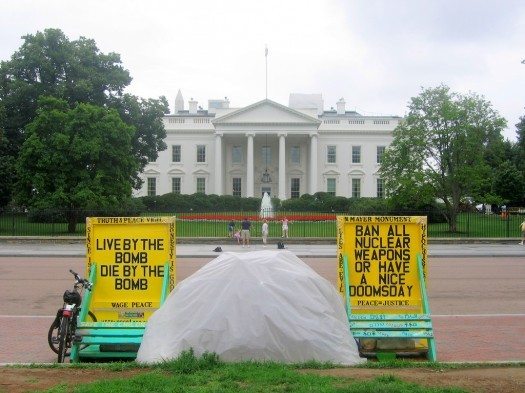Labor & Economy
Reading Activism’s MAP

Last month two of L.A.’s richest men decided they needed to defend their wealth in a Los Angeles Times opinion piece. The headline read: “It Isn’t a Sin to Be Rich.”
Of course it isn’t. No one has said it was a sin to be rich in a very long time. After all, rich is a state of being. It’s greed that makes the list of cardinal sins.
Naturally, social critics and political figures have spoken about the shrinking middle class. They’ve talked about the social instability caused by the exponential growth of wealth and the relatively shrinking resources of the working poor. Even film makers have produced documentaries describing a few people’s wealth growing so exorbitantly that it virtually pauperizes the rest of us. So apparently the two rich guys felt the sting and decided they needed to defend their class.
Which reminded me of words attributed to Gandhi: First they ignore you, then they ridicule you, then they fight you and then you win.
So when activists first began calling for raising the minimum wage to a living wage, people in power ignored them. When Occupy set up camp in New York and other cities around the country, they were roundly ridiculed. The media took it as some sort of youth tantrum imported from the 1960s. But now speaking about the one percent is part of mainstream discussion.
The gap between the rich and the rest of us has become such a prominent issue that not only local wealthy civic leaders feel the need to fight back, so do corporations from McDonald’s to Walmart. These corporate citizens used the holidays to tell their employees how to get by on low wages by accessing government programs like food stamps and health care. Meanwhile they keep workers fearful, on edge and off balance. Part-timers don’t get consistent schedules. Benefits disappear. Activists among the work force with spotless records suddenly get written up for minor infractions. People get laid off.
But then, says Gandhi, we win. Sounds like pie in the sky, but, apparently, winning is actually around the corner. An activist analysis called MAP – Movement Action Plan – developed by American activist Bill Moyer, confirms this scenario. Moyer (not the PBS host) began to study the problem after meeting with a group of depressed anti-nuclear energy activists several decades ago. They had just won a major victory that virtually ended the development of new nuclear plants in this country, but instead of celebrating, they were sinking into despair. He wanted to know why, and here’s the pattern he developed by studying several historic movements.
At first, an issue attracts only a few activists, some of whom engage in public actions that dramatize their concern. The actions draw a core of people dedicated to turning contentment into dissatisfaction. Then, as the general public becomes more aware, conditions shift, and more people join the demand for change — what Moyer labels “Take Off.” After some time, the call becomes so pervasive that government officials and corporate executives must take note.
When people at the top of the power pyramid respond – first to ridicule, then to defend, then to attack – the ground moves. If the activist community stays the course, and if more of the general public climbs aboard, those in positions to make policy begin to address the problem. As that occurs the issue moves into the mainstream. The status quo cannot hold, and we win.
Yes, it is a long process. In the course of a struggle for justice – whether about nuclear energy or racism or global climate change or livable wages – many activists grow weary and discouraged. Often they abandon the cause — a reasonable response when faced with ridicule and harsh antagonism over an extended period of time. But when social-change advocates understand opposition as a sign of their effectiveness, they can take it as encouragement and keep going, knowing success will likely arrive shortly.
I’ve found both Gandhi’s words and Moyer’s concept helpful over the years. They sustain me and keep me balanced. They give me a perspective of hope for the long haul.
(Photo: moi 84/Wikimedia)

-

 Latest NewsFebruary 3, 2026
Latest NewsFebruary 3, 2026Amid the Violent Minnesota Raids, ICE Arrests Over 100 Refugees, Ships Many to Texas
-

 Featured VideoFebruary 4, 2026
Featured VideoFebruary 4, 2026Protesters Turn to Economic Disruption to Fight ICE
-

 The SlickFebruary 2, 2026
The SlickFebruary 2, 2026Colorado May Ask Big Oil to Leave Millions of Dollars in the Ground
-

 Column - State of InequalityFebruary 5, 2026
Column - State of InequalityFebruary 5, 2026Lawsuits Push Back on Trump’s Attack on Child Care
-

 Column - California UncoveredFebruary 6, 2026
Column - California UncoveredFebruary 6, 2026What It’s Like On the Front Line as Health Care Cuts Start to Hit
-

 The SlickFebruary 10, 2026
The SlickFebruary 10, 2026New Mexico Again Debates Greenhouse Gas Reductions as Snow Melts
-

 Latest NewsFebruary 12, 2026
Latest NewsFebruary 12, 2026Trump Administration ‘Wanted to Use Us as a Trophy,’ Says School Board Member Arrested Over Church Protest
-

 Latest NewsFebruary 10, 2026
Latest NewsFebruary 10, 2026Louisiana Bets Big on ‘Blue Ammonia.’ Communities Along Cancer Alley Brace for the Cost.

